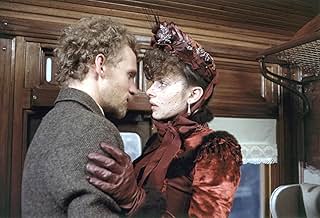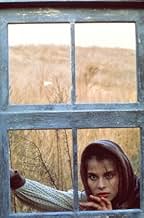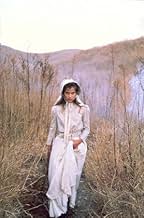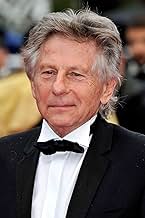AVALIAÇÃO DA IMDb
7,3/10
19 mil
SUA AVALIAÇÃO
Uma jovem camponesa com um caráter forte atrai o afeto de dois homens.Uma jovem camponesa com um caráter forte atrai o afeto de dois homens.Uma jovem camponesa com um caráter forte atrai o afeto de dois homens.
- Direção
- Roteiristas
- Artistas
- Ganhou 3 Oscars
- 16 vitórias e 17 indicações no total
Nastassja Kinski
- Tess
- (as Nastassia Kinski)
Avaliações em destaque
SYNOPSIS A poor girl in late 1800s England is used and abused in her search for love, affection and devotion.
CONCEPT IN RELATION TO THE VIEWER True love is an allusive thing and the rules and morals of an upper class society makes some men into real jerks. Sometimes following your heart can be a difficult road with a lot of dead ends and pitfalls.
PROS AND CONS I watched this film back in college when it first came out. I was a fan of Roman Polanski's work and this was his first film after 'Chinatown', which is one of my all time favorites. I recall that this was a long (almost 3 hours) film that was very slow and beautifully shot. Since I was more interested in car chases and explosion in my youth, I didn't recall this as being a very good film.
Since age tempers a lot of our youthful interests, the second viewing of this film was a much different experience. This is a slow film but it has to be. Life was much methodical and personal in the rural countryside of Victorian England. The script and acting are very intimate and you really get to know the characters as the story unfolds on the screen. The subtle tone of this film is amazing and the level of detail actually makes you believe you are in 1890s England.
The two lead characters played by Nastassja Kinski (Tess) and Peter Firth (Angel) do an exceptional job. Kinski's character is extremely shy and withdrawn. Firth is also engaging in his subtle portrayal of a preachers son trying to find the meaning of life. It is obvious from watching the film that Polanski was infatuated with Nastassja Kinski. He lingers on her in many shots and for good reason. She portrays the perfect heroine, virginal, pure and very beautiful.
The cinematography in this film is even more beautiful the second time around. The surreal scene of a fox hunt emerging from the mist in front of Tess as she walks down a deserted country road is mesmerizing on several levels. The end scene at Stonehenge with the rising sun casting long shadows as the final credits roll is truly breathtaking. There are countless other scenes like this that give the film and almost dreamlike quality.
In the end the viewer feel sorry for Tess as she is led away. She is more a victim of circumstance and the callousness of others than of her own doing. But the world of rural Victorian England was not a nice place, especially if you were poor, naive and very beautiful.
CONCEPT IN RELATION TO THE VIEWER True love is an allusive thing and the rules and morals of an upper class society makes some men into real jerks. Sometimes following your heart can be a difficult road with a lot of dead ends and pitfalls.
PROS AND CONS I watched this film back in college when it first came out. I was a fan of Roman Polanski's work and this was his first film after 'Chinatown', which is one of my all time favorites. I recall that this was a long (almost 3 hours) film that was very slow and beautifully shot. Since I was more interested in car chases and explosion in my youth, I didn't recall this as being a very good film.
Since age tempers a lot of our youthful interests, the second viewing of this film was a much different experience. This is a slow film but it has to be. Life was much methodical and personal in the rural countryside of Victorian England. The script and acting are very intimate and you really get to know the characters as the story unfolds on the screen. The subtle tone of this film is amazing and the level of detail actually makes you believe you are in 1890s England.
The two lead characters played by Nastassja Kinski (Tess) and Peter Firth (Angel) do an exceptional job. Kinski's character is extremely shy and withdrawn. Firth is also engaging in his subtle portrayal of a preachers son trying to find the meaning of life. It is obvious from watching the film that Polanski was infatuated with Nastassja Kinski. He lingers on her in many shots and for good reason. She portrays the perfect heroine, virginal, pure and very beautiful.
The cinematography in this film is even more beautiful the second time around. The surreal scene of a fox hunt emerging from the mist in front of Tess as she walks down a deserted country road is mesmerizing on several levels. The end scene at Stonehenge with the rising sun casting long shadows as the final credits roll is truly breathtaking. There are countless other scenes like this that give the film and almost dreamlike quality.
In the end the viewer feel sorry for Tess as she is led away. She is more a victim of circumstance and the callousness of others than of her own doing. But the world of rural Victorian England was not a nice place, especially if you were poor, naive and very beautiful.
This film was an almost exact replication of Thomas Hardy's novel "Tess of the d'Urbervilles". It's so rare to watch a film after reading the novel and not be disappointed by it, but this film didn't disappoint in any way.
Details, such as the whiteness of the maids' dresses, the sound of milk squirting into a bucket, the sloshing mud of a wet English turnip field, and the glint of adoration in the eyes of the young lovers -- all came gloriously to life as if fresh off the pages of the book.
I highly recommend this film for anyone who enjoys a good old fashioned Victorian love story.
Details, such as the whiteness of the maids' dresses, the sound of milk squirting into a bucket, the sloshing mud of a wet English turnip field, and the glint of adoration in the eyes of the young lovers -- all came gloriously to life as if fresh off the pages of the book.
I highly recommend this film for anyone who enjoys a good old fashioned Victorian love story.
This has been my favourite movie since I first saw it in the late 1980s, and I have viewed it probably once a year since that time. My videotape copy was fading and failing, so I was lucky to replace it recently with the Japanese DVD version.
When you compare it to other films made in 1979, it is amazing how little it has "aged". Of course, it is an historical drama, with a "timeless" setting. And yet the cinematography is so assuredly wonderful that the movie is almost as if set in amber.
Many have commented on the score, and it is a pity that this is no longer in issue. Still, there seem to be enough people like myself who are fans of this film, perhaps there is enough of an interest?
While the A and E version was an above-average production, I think Polanski's beats it on almost any characteristic. Polanski's film is a series of tableaux, very few of which do not work well. (One that I find a little bit stupid is the scene where Tess sleeps out in the forest and the deer comes to visit her. Gimme a break!). There are many scenes which, if left in still, look like 19th century portraiture, a la Mary Cassatt or Edgar Degas. The scene where the pedlar comes across Tess at the Crescent Hand! This guy has just stepped out of another century. This is a stunningly visual movie, and perhaps the reason it is so easy to watch time and time again. The dialogue, too, full of the cadences of West Country speech (still there, but disappearing) are an evocation of a lost age. These are hinted at in the scenes showing the modernization of England (the train bringing the milk to market, the threshing machine) which is changing their lives. Tess, and her aristocratic background, are an anachronism, particularly compared with the worldly (and successful) Stokes.
I enjoy the rhythm of the movie, which is rural and slow. Time is marked in slow and languid drips, such as we see with the milk at the dairy farm, and finally with the blood at the boarding house. This is classic story-telling, replete with foreshadowing (particularly Tess' temper and pride). What I enjoyed most is the symmetry of the story-telling, which make it more myth-like, particularly the juxtaposition of the two opening and closing scenes (the dancing of the village girls at sunset, and Stonehenge--which legend has as a circle of giants dancing and frozen by Merlin--at daybreak). Other examples are Alec Durberville's "saving" Tess from a fight with her "rival" and Angel choosing Tess over her rivals on the flooded road.
As you can see, Tess is a movie that replays itself in my mind. Polanski's effort reflects on what I think is one of the greatest 19th century English novels (in my mind, rivaled only by "Middlemarch"), and is a great springboard to further consideration of art and life.
When you compare it to other films made in 1979, it is amazing how little it has "aged". Of course, it is an historical drama, with a "timeless" setting. And yet the cinematography is so assuredly wonderful that the movie is almost as if set in amber.
Many have commented on the score, and it is a pity that this is no longer in issue. Still, there seem to be enough people like myself who are fans of this film, perhaps there is enough of an interest?
While the A and E version was an above-average production, I think Polanski's beats it on almost any characteristic. Polanski's film is a series of tableaux, very few of which do not work well. (One that I find a little bit stupid is the scene where Tess sleeps out in the forest and the deer comes to visit her. Gimme a break!). There are many scenes which, if left in still, look like 19th century portraiture, a la Mary Cassatt or Edgar Degas. The scene where the pedlar comes across Tess at the Crescent Hand! This guy has just stepped out of another century. This is a stunningly visual movie, and perhaps the reason it is so easy to watch time and time again. The dialogue, too, full of the cadences of West Country speech (still there, but disappearing) are an evocation of a lost age. These are hinted at in the scenes showing the modernization of England (the train bringing the milk to market, the threshing machine) which is changing their lives. Tess, and her aristocratic background, are an anachronism, particularly compared with the worldly (and successful) Stokes.
I enjoy the rhythm of the movie, which is rural and slow. Time is marked in slow and languid drips, such as we see with the milk at the dairy farm, and finally with the blood at the boarding house. This is classic story-telling, replete with foreshadowing (particularly Tess' temper and pride). What I enjoyed most is the symmetry of the story-telling, which make it more myth-like, particularly the juxtaposition of the two opening and closing scenes (the dancing of the village girls at sunset, and Stonehenge--which legend has as a circle of giants dancing and frozen by Merlin--at daybreak). Other examples are Alec Durberville's "saving" Tess from a fight with her "rival" and Angel choosing Tess over her rivals on the flooded road.
As you can see, Tess is a movie that replays itself in my mind. Polanski's effort reflects on what I think is one of the greatest 19th century English novels (in my mind, rivaled only by "Middlemarch"), and is a great springboard to further consideration of art and life.
Considering that the cultures of nineteenth century Europe were supposedly so rigidly moralist, it is perhaps surprising that many of the great novels from that era are themselves attacks upon the rigidity. Or perhaps that is only the ones we remember, the ones that have survived as classics. After all, it is easier for a contemporary reader to imagine being stifled by or fighting against such strict order than to be comfortable and complicit in it. And these are the novels that have made the most powerful and enduring adaptations to our contemporary medium of cinema.
Surely the most outstanding thing about this adaptation of Thomas Hardy's Tess of the d'Urbervilles is its magnificent appearance. The cinematography or Geoffrey Unsworth and Ghislain Cloquet is breathtakingly beautiful, at times referencing various paintings of rural England, with some incredibly natural looking twilight scenes. The art direction and costume design is fabulous too, echoing the tones and textures of the countryside. The design follows such a tight colour scheme, beginning with a motley of off-whites, giving way to greys and browns in the latter half of the picture, and finally a deep crimson. And yet it all looks so natural and unforced.
Director Roman Polanski makes this a rich canvas for his camera. As usual his emphasis is upon confinement, often framing people so the tops of heads are cut off, making the image look short rather than wide. And yet this is a picture very much of the outdoors. Polanski shoots the interiors with briefer shots, more frequent camera moves and many close-ups, and as such the indoor spaces seem the most transient and indistinct, which really helps us get a sense of Tess's feeling of not belonging. Throughout the picture the director encourages slowness, stillness and long takes for key scenes, which brings out the best in the acting performances.
German-born Nastassja Kinski at first seems like an odd choice to play the titular Dorset lass. Her attempt at the accent is a bit wobbly at best (although still impressive considering she is not even English), but really her performance is about more than that. She has that peculiar quiet delicacy that the character requires, and just below the surface of her performance lurk all those suppressed emotions, just visible enough that we believe her final actions. The only other standout is Peter Firth. It works very well the way he appears so mature and manly in his earliest appearances, and then when his feelings towards Tess change, he becomes like a spoiled child. Above all, both performances are calm and subdued.
And subdued calmness is what really marks this movie. Voices are barely distinct. The Philip Sarde music score, containing just a hint of Elgar and Vaughn Williams, is as rich and beautiful as the imagery. It is this non-verbal eloquence that prevents Tess from becoming dull or stilted. The adaptation barely communicates directly with its audience, with no explanatory narration and overt exposition. We are left to infer much, such as the baby which suddenly appears without us even having been aware of the pregnancy. The picture has all the subtlety of a good silent movie, giving us its thoughts and feelings through the purity of its images, and as such very much removed from the word-based format of a novel. And yet Tess retains all the power and meaning as a piece of storytelling.
Surely the most outstanding thing about this adaptation of Thomas Hardy's Tess of the d'Urbervilles is its magnificent appearance. The cinematography or Geoffrey Unsworth and Ghislain Cloquet is breathtakingly beautiful, at times referencing various paintings of rural England, with some incredibly natural looking twilight scenes. The art direction and costume design is fabulous too, echoing the tones and textures of the countryside. The design follows such a tight colour scheme, beginning with a motley of off-whites, giving way to greys and browns in the latter half of the picture, and finally a deep crimson. And yet it all looks so natural and unforced.
Director Roman Polanski makes this a rich canvas for his camera. As usual his emphasis is upon confinement, often framing people so the tops of heads are cut off, making the image look short rather than wide. And yet this is a picture very much of the outdoors. Polanski shoots the interiors with briefer shots, more frequent camera moves and many close-ups, and as such the indoor spaces seem the most transient and indistinct, which really helps us get a sense of Tess's feeling of not belonging. Throughout the picture the director encourages slowness, stillness and long takes for key scenes, which brings out the best in the acting performances.
German-born Nastassja Kinski at first seems like an odd choice to play the titular Dorset lass. Her attempt at the accent is a bit wobbly at best (although still impressive considering she is not even English), but really her performance is about more than that. She has that peculiar quiet delicacy that the character requires, and just below the surface of her performance lurk all those suppressed emotions, just visible enough that we believe her final actions. The only other standout is Peter Firth. It works very well the way he appears so mature and manly in his earliest appearances, and then when his feelings towards Tess change, he becomes like a spoiled child. Above all, both performances are calm and subdued.
And subdued calmness is what really marks this movie. Voices are barely distinct. The Philip Sarde music score, containing just a hint of Elgar and Vaughn Williams, is as rich and beautiful as the imagery. It is this non-verbal eloquence that prevents Tess from becoming dull or stilted. The adaptation barely communicates directly with its audience, with no explanatory narration and overt exposition. We are left to infer much, such as the baby which suddenly appears without us even having been aware of the pregnancy. The picture has all the subtlety of a good silent movie, giving us its thoughts and feelings through the purity of its images, and as such very much removed from the word-based format of a novel. And yet Tess retains all the power and meaning as a piece of storytelling.
Roman Polanksi's Tess gets better and better with age.
The mists...the sounds of footsteps on the dirt roads... the ambling horse... the elflike man that appears at the Cross in Hands, Tess' walk to her Inlaws church, The dripping water, The taking of the boots, the misplaced letter, the milk run, the puddle in the road, the dripping milk pouches, The strawberry, the blood stain, The burial, Stonehenge...Everything is beautifully shot. It lingers in the mind long after viewing. Geoffrey Unsworth's final cinematographic film. Thank you for all your beautiful work.
It is neither pretentious nor bold.
Mesmerizing! The musical composition is charging.
Nastassja Kinski's plays the title character. She reacts so well. Her beauty in a time of such oppression and depression would be an ill fate. Tess knows this fate and she wishes she was never born. She is the sacrifice of a paradigm. Victorian era was finished. Edwardian Enlightenment would soon come but not for Tess, the sacrificial pure beauty.
Thomas Hardy created a pure woman in Tess. That is why her plight is so tragic. She possesses a strong spirit that is oppressed by the male political and religious world around her.
The opening shot is well directed in the morning sunrise as fair maidens dance with one another. Tess' oversight by Angel begins this tragic tale. "As Flies to wanton boys, are we to the Gods, they kill us for their sport."
Tess, Thomas Hardy
Do not take your eyes off of it. It is beautifully told!
Victor Nunnally, BFA Dramatic and Film Theory and History, AA Performing Experience.
The mists...the sounds of footsteps on the dirt roads... the ambling horse... the elflike man that appears at the Cross in Hands, Tess' walk to her Inlaws church, The dripping water, The taking of the boots, the misplaced letter, the milk run, the puddle in the road, the dripping milk pouches, The strawberry, the blood stain, The burial, Stonehenge...Everything is beautifully shot. It lingers in the mind long after viewing. Geoffrey Unsworth's final cinematographic film. Thank you for all your beautiful work.
It is neither pretentious nor bold.
Mesmerizing! The musical composition is charging.
Nastassja Kinski's plays the title character. She reacts so well. Her beauty in a time of such oppression and depression would be an ill fate. Tess knows this fate and she wishes she was never born. She is the sacrifice of a paradigm. Victorian era was finished. Edwardian Enlightenment would soon come but not for Tess, the sacrificial pure beauty.
Thomas Hardy created a pure woman in Tess. That is why her plight is so tragic. She possesses a strong spirit that is oppressed by the male political and religious world around her.
The opening shot is well directed in the morning sunrise as fair maidens dance with one another. Tess' oversight by Angel begins this tragic tale. "As Flies to wanton boys, are we to the Gods, they kill us for their sport."
Tess, Thomas Hardy
Do not take your eyes off of it. It is beautifully told!
Victor Nunnally, BFA Dramatic and Film Theory and History, AA Performing Experience.
Você sabia?
- CuriosidadesThe film's opening dedication at the start of the film states: "For Sharon". Roman Polanski dedicated this movie to his late wife, Sharon Tate, who was killed in 1969 by the Manson Clan. Before Tate's death, she had read the film's source novel by Thomas Hardy and was convinced that her husband would one day make a great film based on the novel, with the hope that she would star in it. Movie was released to the theaters exactly 10 years after her untimely death.
- Erros de gravaçãoAt the beginning of the final sequence, set at Stonehenge, someone's head can be seen at bottom-left.
- Versões alternativasThe film was first released to German cinemas uncut with a running time of 184 minutes. As the audience reaction was far from overwhelming the distributor decided to re-cut and re-release the film in a more "accessible" 134 minutes version. But at least one of the original prints had survived and was shown here at the local art house years later.
- ConexõesFeatured in The 38th Annual Golden Globe Awards (1981)
Principais escolhas
Faça login para avaliar e ver a lista de recomendações personalizadas
- How long is Tess?Fornecido pela Alexa
Detalhes
Bilheteria
- Orçamento
- US$ 12.000.000 (estimativa)
- Faturamento bruto nos EUA e Canadá
- US$ 20.093.330
- Faturamento bruto mundial
- US$ 20.101.247
- Tempo de duração
- 3 h 6 min(186 min)
- Cor
- Proporção
- 2.35 : 1
Contribua para esta página
Sugerir uma alteração ou adicionar conteúdo ausente


































